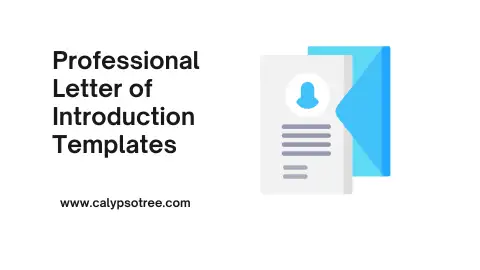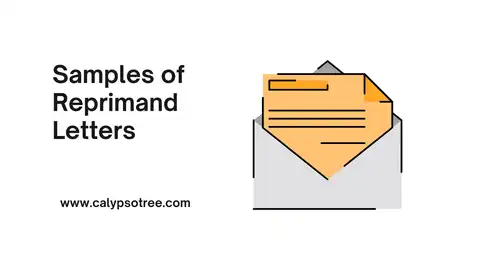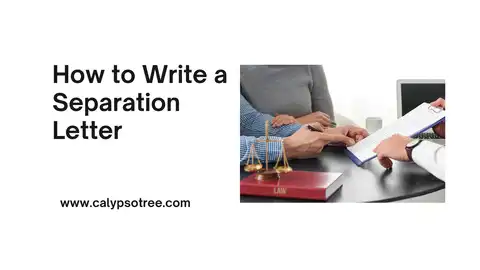Boost your grant chances with our grant letter of support templates and expert guide. Learn how to get strong, persuasive letters.
Are you struggling to get those crucial letters of support for your grant? You know they’re important, but how do you get busy people to write glowing recommendations for your project? That’s where we come in! Think of letters of support as supercharged references for your grant proposal.
What’s a Letter of Support?
It’s a short, official letter written by someone who believes in your project. This could be a local business owner, another nonprofit, a teacher – anyone who knows your work and thinks your project will make a difference. Good letters of support add a powerful boost to your application!
Key Elements of an Effective Letter of Support
Here’s a key components of a letter of support, focusing on what each section accomplishes:
Opening and Introduction
Writer’s Credentials:
- Why it matters: Establishes the writer as a knowledgeable, credible voice. This isn’t just anyone, but someone whose opinion holds weight in relation to the project.
- Example: “As Director of the City Parks Department…” or “As a teacher at [School Name] for 15 years…”
Clear Endorsement:
- Why it matters: No beating around the bush! Immediate enthusiasm sets a positive tone and grabs the grant reviewer’s attention.
- Example: “I wholeheartedly support [Organization]’s grant proposal for the [Project Name] initiative.”
Understanding of the Project
Demonstrate Knowledge:
- Why it matters: Shows the writer didn’t just sign a generic letter. They took the time to understand the project’s purpose and methods.
- Example: “Your plan to expand after-school tutoring aligns perfectly with our district’s focus on improving reading scores…”
Relevance:
- Why it matters: Strengthens the support by connecting the writer/their organization to the project’s mission.
- Example: “As a company committed to sustainability, we’re excited about your community recycling program…”
Value and Impact
Benefit to the Community:
- Why it matters: Moves beyond “This is a good idea” to showing how it solves a real problem or improves lives in the community the grant serves.
- Example: “This playground renovation will provide a safe, accessible play space in an area where children desperately need it.”
Unique Contributions:
- Why it matters: This is where the writer seals the deal! Shows they’re not just cheerleading, but will actively help make the project successful.
- Example: “Our organization can offer marketing expertise, a network of volunteers, and the use of our community center…”
Commitment and Collaboration
Level of Commitment:
- Why it matters: Vagueness is the enemy here. Are they offering money, volunteer hours, specific skills?
- Example: “We pledge $5000 toward this project, along with…”
Tangible Examples:
- Why it matters: Proves the commitment is genuine, not just empty words.
Closing
Reiterate Support:
- Why it matters: Leaves the grant reviewer with a strong final impression of the writer’s belief in the project.
Contact Information:
- Why it matters: Shows a willingness to answer further questions and makes follow-up easy.
When to Ask for Support Letters
Letters of support can seriously boost your chances of winning grant money. But when’s the right time to ask for them?
- The Grant Requires It: Duh! Some grant applications specifically say you need letters of support. Read the instructions carefully!
- You Want to Stand Out: Even if letters aren’t required, strong ones can make your application way more impressive than the competition.
- You Have Awesome Partners: If you’re already working with businesses, other nonprofits, or experts who love your project, ask them to write a letter! This shows the grant funders you’re a team player.
- You Need Specific Help: Maybe you need a space to hold events, volunteers, or someone to donate supplies. A letter of support can promise those things, making your grant application stronger.
Things to Remember:
- Ask Early! Don’t wait until the last minute. Give your partners time to write a thoughtful letter.
- Make It Easy: If possible, provide a short template or some bullet points of the key info to include.
- It’s Not Just About the Letter: Build real relationships with your partners. That makes their support genuine, which shines through in their writing.
Why You Need Letters of Support for Your Grant
Think of your grant application like applying for a really important job. Letters of support are like glowing recommendations from people who know you and your work. Here’s why they matter:
- Shows You’re Legit: These letters prove that other people in your community believe in your project and think you can pull it off.
- Teamwork Power: Grant funders want to see you have partners. This shows your project is connected to the community and has a better chance of long-term success.
- Why Your Project is Special: A good letter of support doesn’t just say, “This is cool.” It explains exactly how your project solves a problem and why the person writing the letter wants to be part of that.
- Standing Out: Lots of people apply for grants! Strong letters of support can give you the edge and show that your project deserves the money.
- Extra Info: Sometimes these letters mention things about your project that aren’t in the main application. This gives the grant people a fuller picture!
Who’s the Perfect Person to Write Your Support Letter?
Choosing the right people to ask is key to getting awesome letters of support. Here’s how to find them:
- Mission Match: Look for people or groups whose work is similar to your project’s goals. Example: If you’re building a playground, a school principal or child health organization would be a good fit.
- The Helper Squad: Who have you worked with on successful projects in the past? They already know you rock!
- Boost Your Business: Could your project help a local business? Maybe they attract more customers, or you’ll need to buy supplies from them. Showing that benefit makes them more likely to help.
- Community Stars: Is there a well-known teacher, community leader, or organization that people respect? Their support carries a lot of weight.
How to Write a Great Grant Letters of Support?
Here’s how to make those letters powerful:
Step 1: Introduce Yourself with Impact
- Who are you?: Your title and organization – make sure it’s clear why your opinion matters.
- Pump Up the Enthusiasm!: Start strong with “I’m totally excited to support [Project Name]…”
Step 2: Make It Personal
- Why Does This Project Matter to YOU?: Connect it to your own work, expertise, or your organization’s mission.
- Real-World Change: Explain how this project will make a positive difference in the community.
Step 3: Show Off Your Superpowers
- How Will You Help?: Be specific! Offer money, volunteer time, supplies, your special skills, or a place to meet.
- Prove Your Awesome: Mention a past project you helped with that was a success (if you have one!).
Step 4: The Grand Finale
- Summarize Your Support: Remind them in a few sentences why you believe in this project.
- Easy to Contact: Include your email or phone number so the grant people can reach out with questions.
Need more grant writing guidance? Check out our full suite of resources [Link]”.
Common Mistakes in Grant Letters of Support (And How to Fix Them!)
You’ve asked someone to write a letter supporting your grant project – awesome! But there are a few ways these letters can fall flat. Here’s what to avoid:
Mistake #1: Generic Praise
Problem: Saying “This project is great” isn’t very helpful. The best letters are personal.
How to Fix It:
- Ask for specifics: Suggest the writer explain why the project matters to them and fits their organization’s goals.
- Give them a nudge: Ask if they have a past success story that relates to your project. They can mention that!
Mistake #2: No Real Promises
Problem: Just saying “We support this idea” is weak. Funders want to see action!
How to Fix It:
- Be upfront: When you ask for the letter, clearly state what kind of help you need (money, volunteers, supplies, etc.).
- Make it easy: Give the writer a few options for how they could help. This gets their ideas flowing.
Mistake #3: Misaligned Expertise
Problem: A letter from someone who has nothing to do with your project is confusing.
How to Fix It:
- Choose wisely: Pick people or organizations whose work or mission connects to your project’s goals.
- Explain the connection: When you ask for the letter, briefly mention why you think their expertise would be a perfect fit.
Mistake #4: Neglecting Proofreading
Problem: Sloppy mistakes make your whole project seem less professional.
How to Fix It:
- Stress the importance: Let the writer know a polished letter makes them look good too!
- Lend a hand: If they’re short on time, offer to proofread their letter before it goes out.
Extra Tips:
- Templates Help, But Don’t Be a Robot: A basic template is a good start, but make sure the final letter sounds like a real person wrote it.
- Don’t Rush: Give your partners time to write something great. Rushed letters are rarely amazing.
- Say Thanks! A thank-you note after shows you’re grateful and makes them more likely to help out again in the future.
Free Grant Letter of Support Templates & Examples
Templates are like a recipe for writing a letter of support. Here’s a simple one:
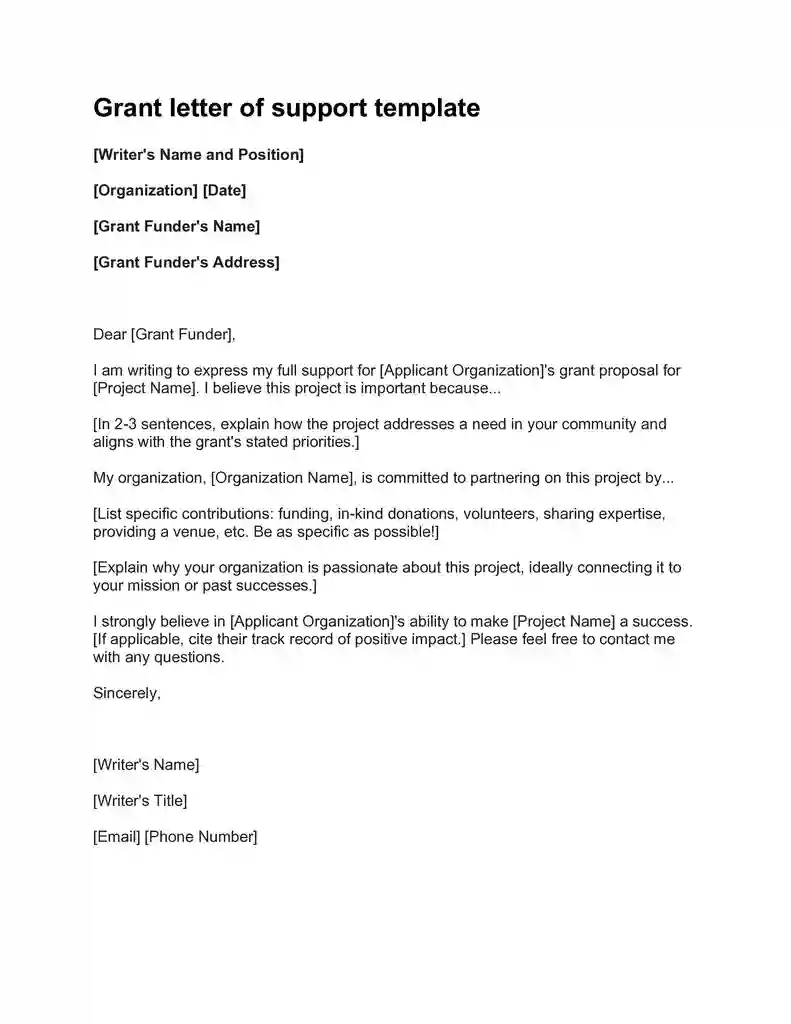
Grant Letter of Support Templates Concise and Impactful
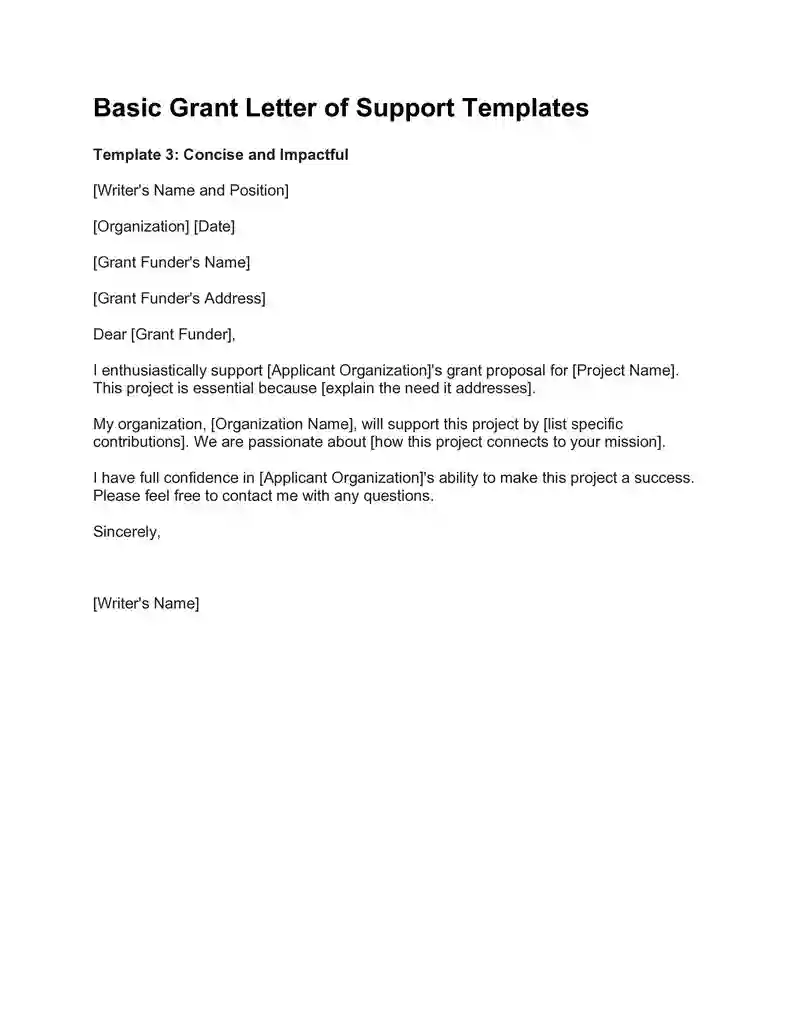
Grant Letter of Support Templates Emphasis on Expertise
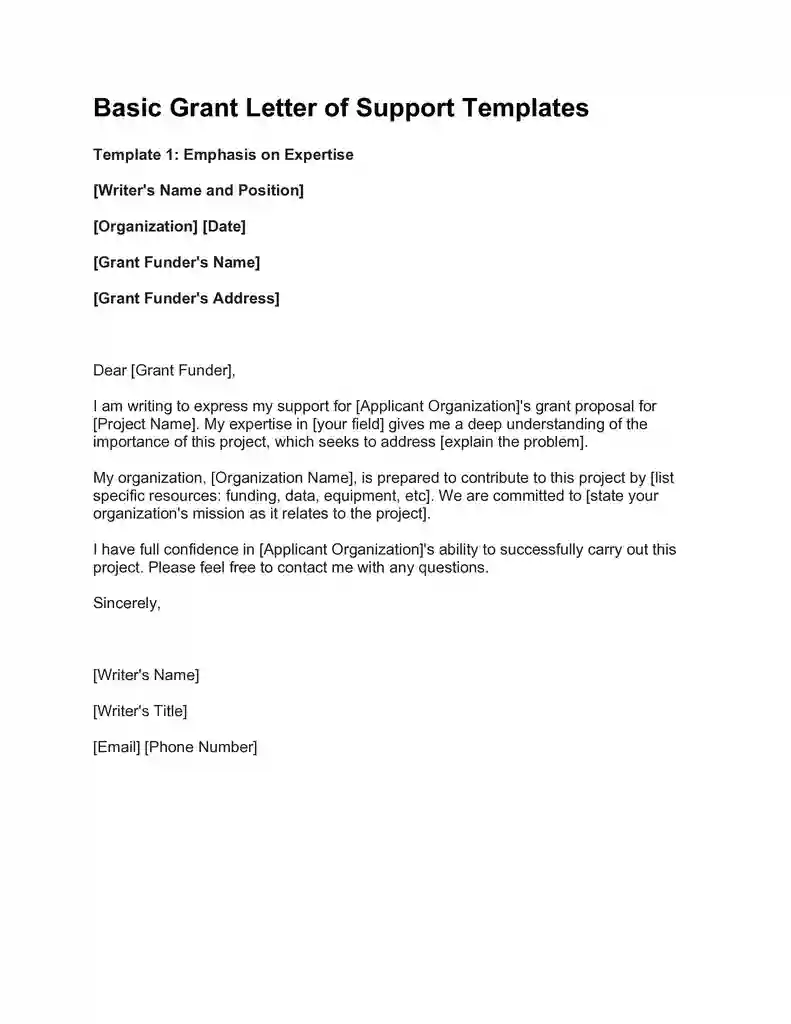
Basic Grant Letter of Support Templates Focus on Partnership
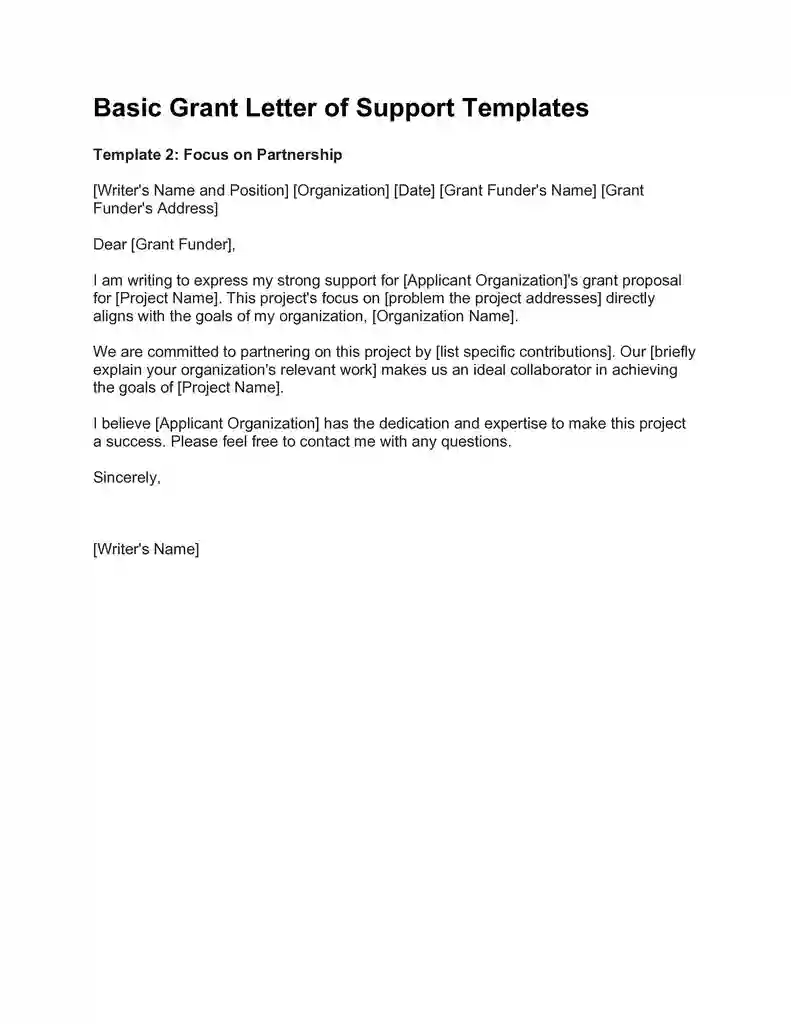
Environmental grant letter of support template
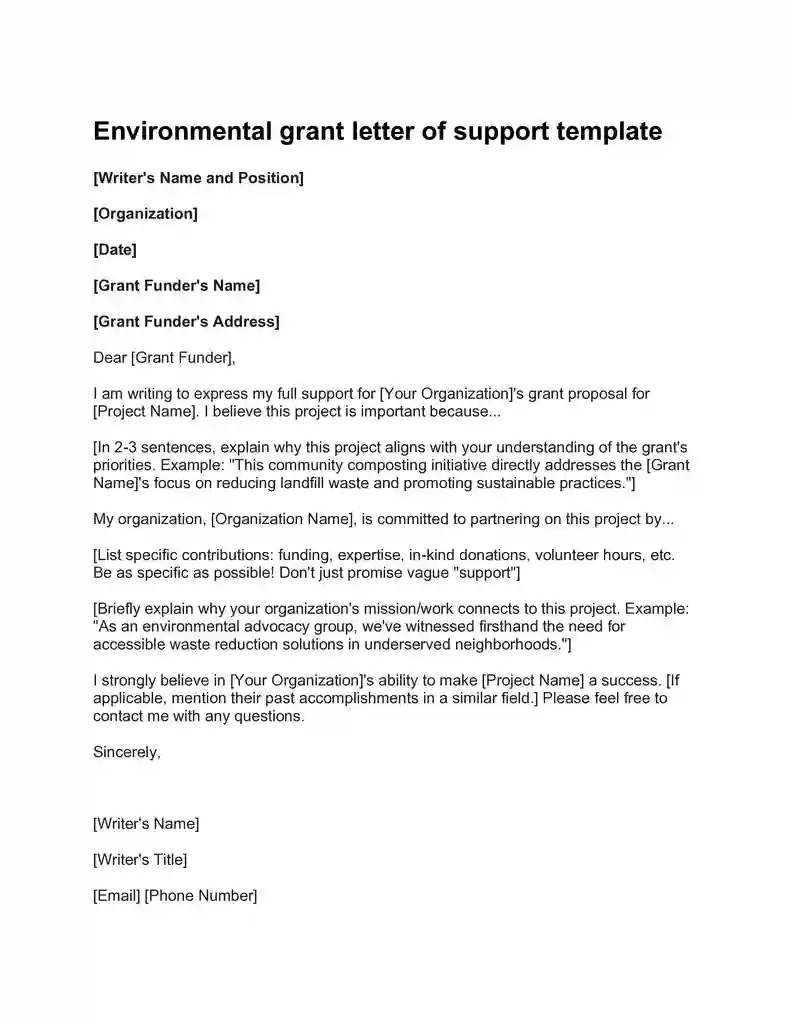
Gates Foundation grant letter of support Sample
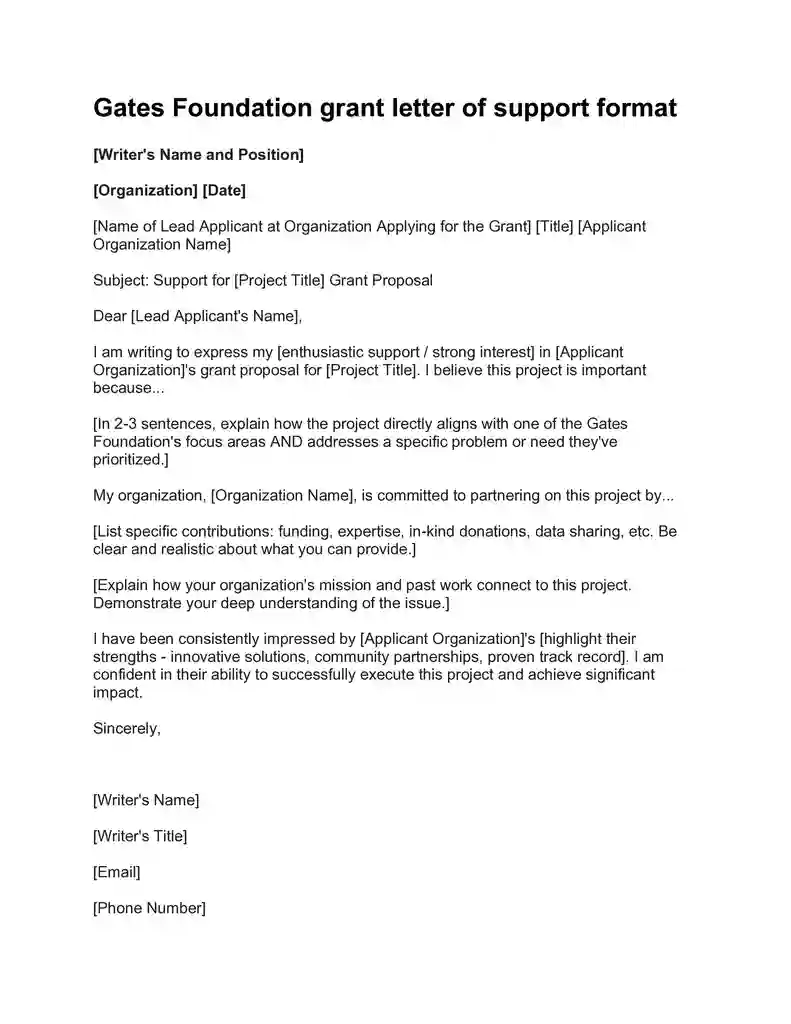
Letter of support for educational grant
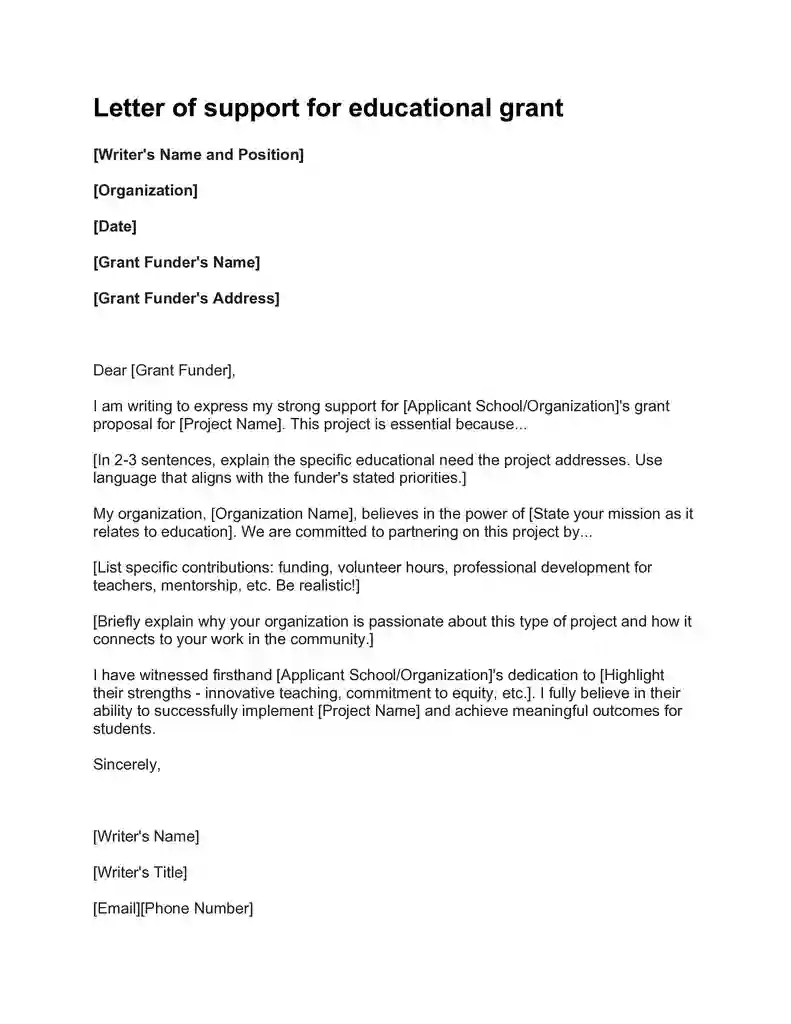
letter of support for grant example
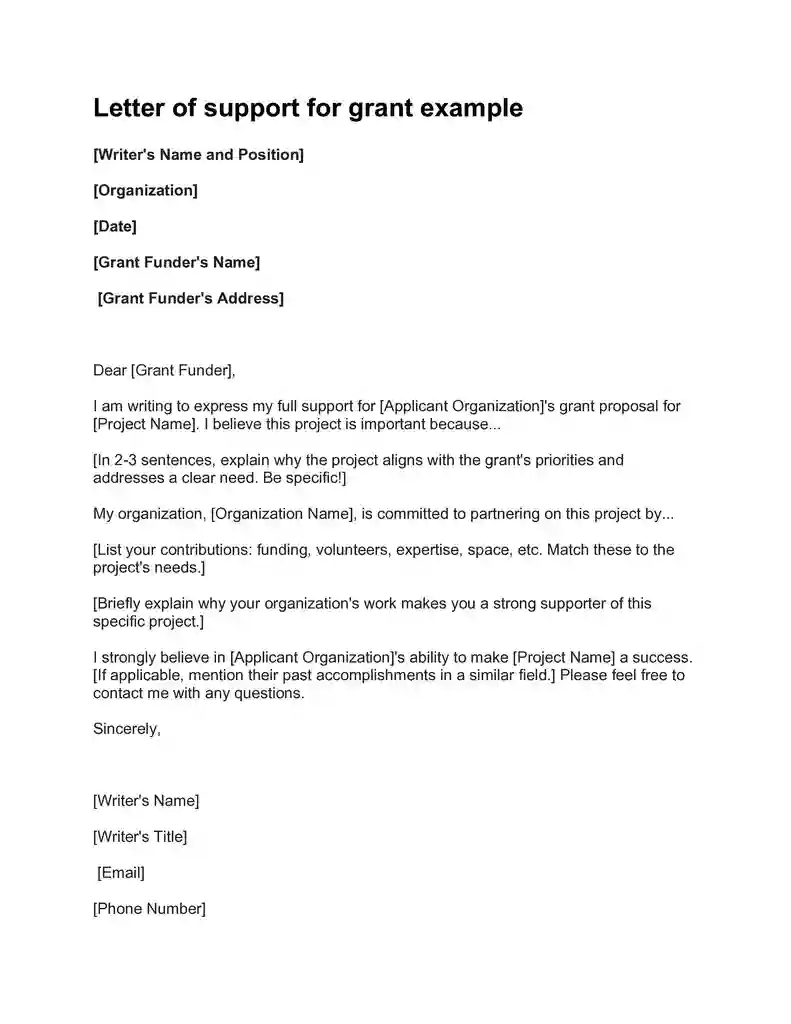
Nonprofit grant letter of support template
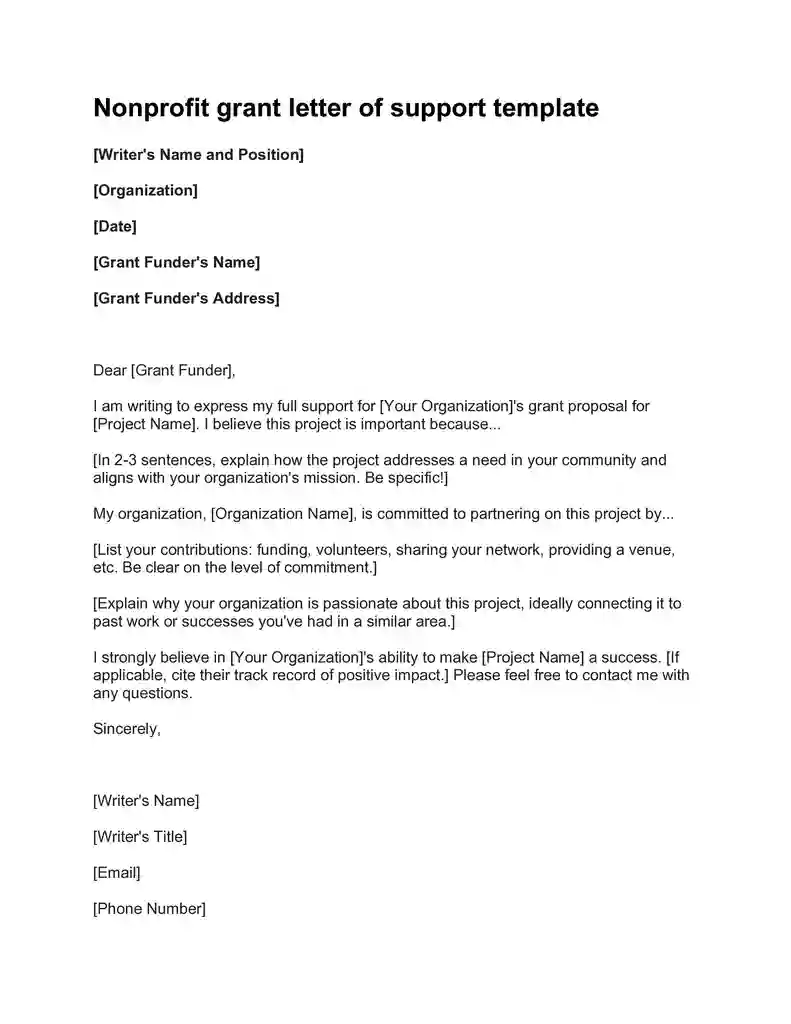
Research grant letter of support template
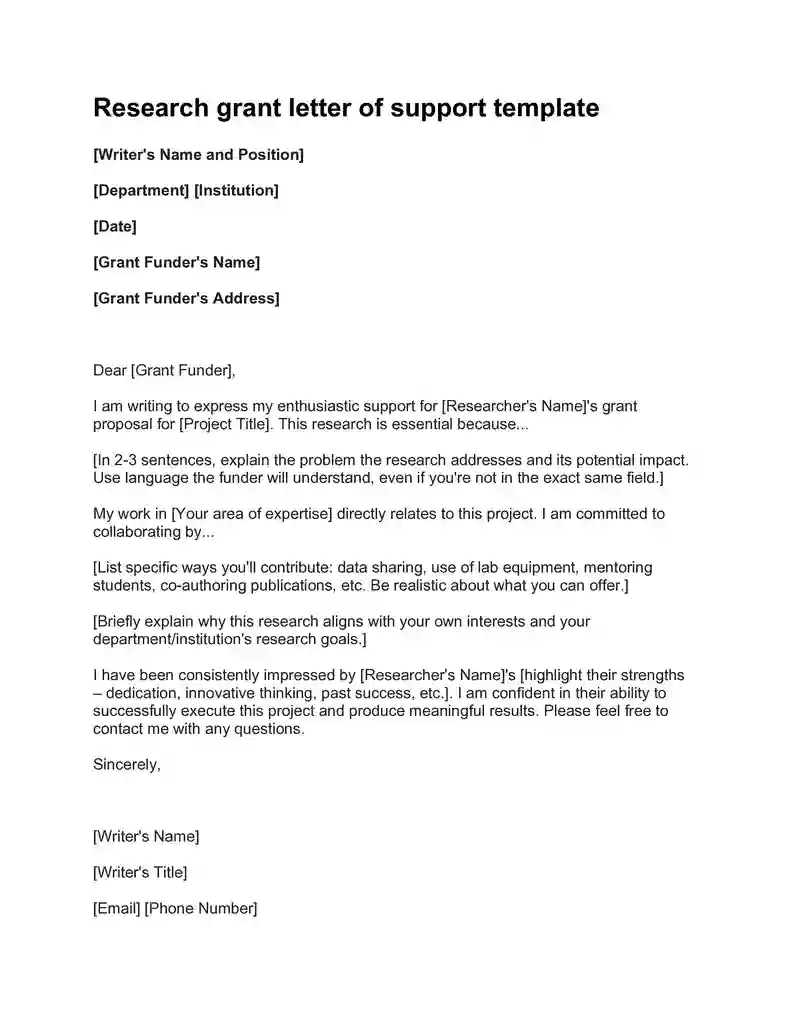
Sample NIH grant letter of support Letter
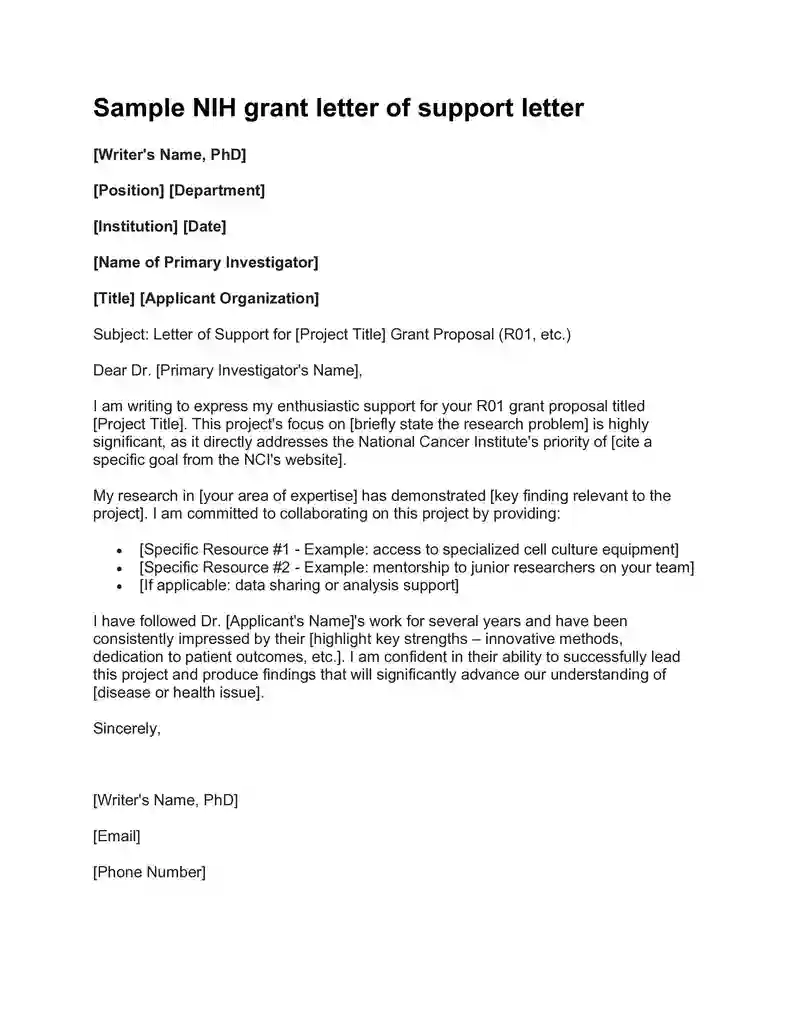
Why Use Templates
Here’s why:
- Saves Time: Templates give your partners a basic outline, so they don’t have to write a letter from scratch. This is great for busy people!
- Makes Sure Nothing’s Missing: A good template reminds the writer to include all the important stuff – who they are, why they support your project, and how they’ll help.
- Looks More Pro: If you need several letters, templates help them all sound similar and polished. This makes a stronger impression on the grant funders.
- Don’t Forget to Customize! Templates are a starting point. The best letters still feel personal and show the unique connection between your project and the partner
Important Tips to Make Your Support Letters
- Customize!: Templates are a helpful start, but the best letters feel personal. Add details about why YOU care about the project and how your unique skills will help.
- Choose Wisely: Choose people or organizations who are truly excited about your project, not just anyone who will say yes. Their enthusiasm will come through in the letter.
- Check for Mistakes: Typos or confusing sentences make your whole project seem less polished. Read your letter out loud to catch errors, or ask a friend to help edit.
The Winning Formula
A strong letter of support can make a huge difference when you’re applying for a grant. Download some templates, start writing, and show everyone why your project deserves support!

The content creator team at calipsotree.com is dedicated to making topics accessible to everyone, with over 9 years of experience in writing and breaking down complex concepts into easy-to-understand articles that answer readers’ financial questions.






